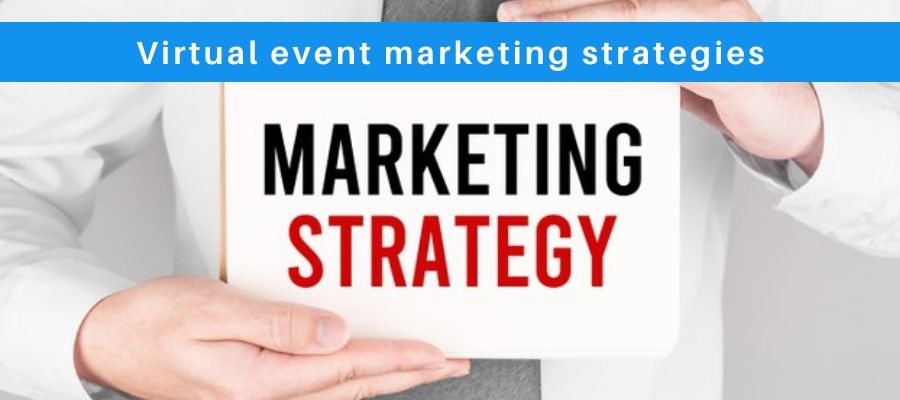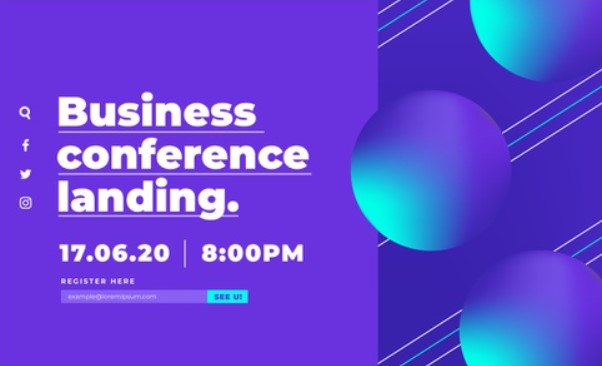Top virtual event marketing strategies
May 17, 2021

Implementing the right marketing strategies is very crucial for any business to succeed, and virtual events are no different. Infact, considering the global reach of online events, having a go-to-market plan can go a long way.
So even if your event calendar is already planned for the coming year, it is important to record the performance of every event and keep improving the manner in which you promote your future events.
Marketing strategies for virtual events
Below are some strategies that will help you through the entire event journey, generating buy-ins from critical stakeholders.
1. An eye-catching event page

Creating the landing page for your event, be it the registration form, or the event details page, is the most important step in promoting your events effectively. In order to capture the essence of your event, make sure the landing page is compact, concise, and to the point. One should consider including the following aspects on the events page:
- Company logo, banner, and footer
- Date and time of the event
- Agenda of the event
- Bios of the speakers and keynote speakers
- Information about the sponsors
- Links to subscribe to newsletters or future communication
- Social share options for the visitors
- Secure payment portal (optional)
2. Email marketing – A useful tool

Email marketing has always been and is always going to be a much-needed pinch of personal touch in B2B marketing. It is an effective and efficient mode of communication in all areas of business. Having said that, emails should be selective, and one should be careful not to overwhelm the mailbox of his recipients. Below are a few suggestions on email marketing:
- Make sure to use specific ‘to’ and ‘from’ email addresses and not generic ones like info@companyname.com
- Send newsletter updates of the upcoming events to your curated list
- Include exciting updates, event announcements, post-event surveys
- Most importantly, use concise and effective subject lines.
- Enhance your emails with imagery, event photos, coupons, discounts, to better engage readers.
3. Organic traffic from social media platform

Building anticipation among the audience before the launch of the event works wonders. Social Media is the right platform to engage your target audience with short previews, live sessions with keynote speakers, and clips of ‘what to expect’ from the event. Below are some pointers on most commonly used social media platforms:
- Facebook events are easy to share, free, and help you track RSVPs.
- LinkedIn is great for B2B marketing. It gives many options to market your content such as ads, groups, promoting on your company page, stories, and more.
- Hashtags are trending with Twitter and Instagram. Create a hashtag for your event and let it spread like wildfire.
- Share pictures and video clips, or create contests and giveaways on Instagram to create interest.
4. Press release
There is a common belief that ‘Press Releases’ are associated with in-person events, but that’s not true. Press releases help you create a much-required buzz in the market. To make it more effective, boost it with correct keywords, share speaker details, topics, special guests, and takeaways. Share this piece of content on media outlets, news desks, emails, company websites, and free press release websites.
5. Influencers and sponsors
Influencer marketing is gaining more value as social media platforms are becoming strong marketing tools. Influencers and your sponsors can spread the word for the upcoming event by posting on their social media, sharing affiliate links, and other material, reaching a much wider audience.
6. PPC advertising campaigns
If you are aiming to reach a specific audience, paid search ads or PPC ads will work for you. With use of keywords, Pay-per-click advertising appears in search engines like Google or Bing, when a target customer is searching for a product or service. This marketing tool is simple to use but difficult to manage and setup. Not to mention that it can be fruitless and expensive if used incorrectly. On the other hand, if it is customized in alignment with the target audience, it gives an exponential boost to your up-coming event.
Another important point is the follow-up stage after the event. It is always good practise to take feedback from the audience in the form of post-event surveys, and to share a recording of the event. These steps ensure you get an insight into how the audience felt about the event and ways you can improve.
There are many ways to market your virtual event and the strategies you choose depend on the scale of your online event. In this blog, we have tried to lay out a few common marketing practices, and following these will definitely help you increase registrations and drive attendance.
Now one might think that it’s just an online event and how much promotion is too much? Can we not just post it on our social media page? Is it worth spending additional time, money, and other resources on marketing it? If yes then will the efforts yield the expected results?
We at Beetsol can help you assess these press questions. Feel free to reach us at +1(512) -333-4588 for advice related to promoting and marketing your online events.


